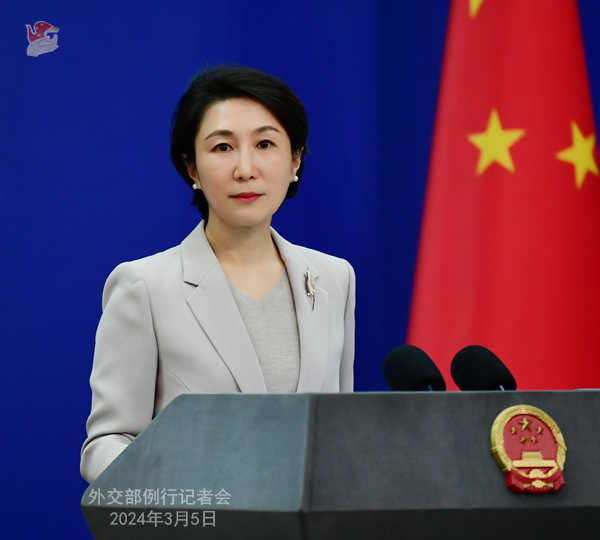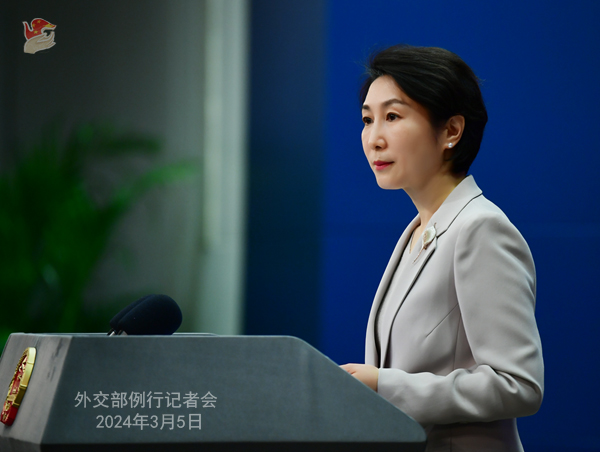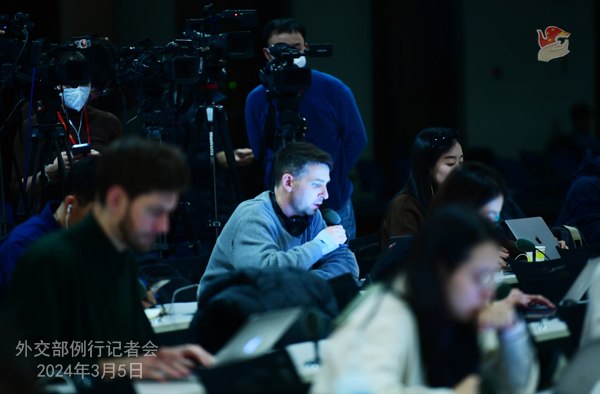
Xinhua News Agency: On March 4, the donation ceremony of the emergency aids for fighting dzud provided by the Chinese government to the Mongolian government was held at the State Palace of Mongolia. Mogolian Prime Minister Oyun-Erdene Luvsannamsrai attended the event and thanked China for the assistance. Could you share with us more information on the assistance?
Mao Ning: China and Mongolia are friends and neighbors connected by mountains and rivers, and we have always helped each other in trying times. During the pandemic, the two countries gifted one another with sheep and tea, which is still a much-told story. Recently, Mongolia has suffered rare and extreme cold weather and snow storms, and the livelihood and production of many herders in the country are faced with severe difficulties. China is paying close attention to this. To address the urgent needs of the people in affected areas and support Mongolia in fighting the disaster, the Chinese government provided emergency cash assistance to the Mongolian government. Local government and the Red Cross Society in China also delivered funds and material aids to the Mongolian side. China’s Embassy and Consulate in Mongolia and Chinese companies also made donations and actively engaged in local rescues. This is another good example of building a China-Mongolia community with a shared future. We believe that with joint efforts of all sides, the Mongolian people will tide over the current difficulties and return to normal life at an early date.
AFP: According to relevant departments of China and the Philippines, Chinese and Philippine boats collided in the South China Sea today. Aside from the statement of China Coast Guard, does China have any other comment on this?
Mao Ning: As you mentioned, the spokesperson of China Coast Guard has released a statement on relevant information. On March 5, two supply vessels and two Coast Guard vessels of the Philippines, without permission from the Chinese government, intruded into the adjacent waters of Ren’ai Jiao of China’s Nansha Qundao, in an attempt to send materials, including construction materials, to the vessel illegally grounded at Ren’ai Jiao. China Coast Guard took necessary measures toward Philippine vessels in accordance with the law. The actions taken at the scene were professional, restrained, justified and lawful. The Chinese Foreign Ministry has lodged serious representations to the Philippine side to express our strong protest.
China’s position on the issue of Ren’ai Jiao is consistent and clear. For some time, China and the Philippines have maintained communication on properly managing the situation at Ren’ai Jiao. The Philippines once again broke its promise to China by making infringement and provocations, and creating trouble in the waters of Ren’ai Jiao, seriously violating China’s territorial sovereignty and maritime rights and interests.
China once again urges the Philippines to stop maritime infringement and provocation, and refrain from taking any action that may complicate the situation at sea. China will continue to firmly safeguard our territorial sovereignty and maritime rights and interests in accordance with domestic and international laws.
CCTV: The Senate of the Philippines recently approved the “Maritime Zones Act”. What’s your comment?
Mao Ning: China noticed the relevant developments. The “Maritime Zones Act” approved by the Senate of the Philippines has attempted to further enforce the illegal arbitral award on the South China Sea by domestic legislation and include China’s Huangyan Dao, most islands and reefs of China’s Nansha Qundao, and their adjacent waters into its maritime zones, which severely violates China’s territorial sovereignty and maritime rights and interests in the South China Sea. China firmly opposes it and has lodged solemn démarches to the Philippines. I would like to reaffirm China’s position as follows:
First, China has sovereignty over Nansha Qundao, Zhongsha Qundao, including Huangyan Dao, and their adjacent waters, and has sovereign rights and jurisdiction over relevant waters. China’s above-mentioned sovereignty, rights and interests in the South China Sea were established in the long course of history, and are solidly grounded in history and the law, which are in compliance with the UN Charter and international law, including the United Nations Convention on the Law of the Sea (UNCLOS).
Second, the territory of the Philippines is defined by a series of international treaties. China’s Huangyan Dao and other islands and reefs of Nansha Qundao are completely beyond the limits of the Philippines’ territory. The Philippines’ illegal occupation of Mahuan Dao, Feixin Dao, Zhongye Dao, Nanyao Dao, Beizi Dao, Xiyue Dao, Shuanghuang Shazhou and Siling Jiao in China’s Nansha Qundao severely violates international law, including the UN Charter. The Philippines arbitrarily went beyond its territorial scope to set up the so-called “Kalayaan Island Group”, which has violated China’s territorial sovereignty. This is illegal, null and void.
Third, without the Chinese government’s prior consent, the Philippines unilaterally initiated an international arbitration, which violated international law, including UNCLOS. The arbitral tribunal in the South China Sea arbitration handled the case ultra vires and made an illegitimate ruling. The rendered award is illegal, null and void. China neither accepts nor participates in that arbitration, neither accepts nor recognizes the award, and will never accept any claim or action arising from the award. China’s territorial sovereignty and maritime rights and interests in the South China Sea will not be affected by the award in any way.
Fourth, territorial sovereignty is the precondition and foundation for the generation of maritime rights and interests. Under the pretext of implementing UNCLOS, the Philippines has advanced the legislation of the “Maritime Zones Act” in an attempt to put a legal veneer on its illegal claims and actions in the South China Sea. Such an “Act” goes against the provisions of international law, including the UN Charter and UNCLOS, and against the spirit of the Declaration on the Conduct of Parties in the South China Sea. This egregious act will inevitably make the situation in the South China Sea more complex.
Fifth, China urges the Philippines to earnestly respect China’s territorial sovereignty and maritime rights and interests, immediately end any unilateral move that may escalate the dispute and complicate the situation, return to the right track of properly settling differences through negotiation and consultation as soon as possible and work with China to uphold the larger interest of the bilateral relations and keep the South China Sea peaceful and stable.

Global Times: It was reported that on March 4, Nepal’s Prime Minister Pushpa Kamal Dahal “Prachanda” ended the partnership with the Nepali Congress party, joined forces once again with the Communist Party of Nepal (Unified Marxist-Leninist) to form a coalition government and reshuffled the cabinet. What is China’s comment?
Mao Ning: China noted that Nepal has formed a new government coalition and reshuffled the cabinet recently. We sincerely hope that the relevant parties of Nepal will work together in solidarity, advance the work related to the formation of the new government in a smooth manner, and realize political stability, economic growth and improvement of people’s livelihood. As a friendly neighbor and cooperation partner, China highly values its relations with Nepal. We would like to work with the new government to uphold the Five Principles of Peaceful Coexistence, deepen our traditional friendship, strengthen practical cooperation, advance the China-Nepal strategic partnership of cooperation featuring ever-lasting friendship for development and prosperity, and deliver more benefits to the peoples of the two countries.
Bloomberg: The Maldives on social media reports that China will provide military assistance to the Maldives. Can you comment on this?
Mao Ning: On your specific question, I’d refer you to competent Chinese authorities. More broadly, China is committed to working with the Maldives to build a comprehensive strategic cooperative partnership. Normal cooperation between China and the Maldives does not target any third party and will not be disrupted by any third party.
AFP: Yesterday, the UN High Commissioner for Human Rights called on China to implement the recommendations made by his Office and asked China to stop the law, policies and practices that “violate” human rights in Xinjiang and Tibet. What is China’s response?
Mao Ning: A happy life for the people is the most important human right. Putting the people front and center, China has worked to realize, protect and advance the fundamental interests of the greatest majority of the people. We have found a path toward better human rights that follows the trend of the times and fits our national realities and made historic achievements in the human rights cause. Currently, China’s Xinjiang and Xizang enjoy social stability, economic growth, solidarity among all ethnic groups and harmony among various religious beliefs, and the people there are living a happy life.
China stands ready to carry out dialogue and communication with the UN human rights body and other parties on the basis of mutual respect to enhance understanding, build up consensus and jointly provide positive energy for global human rights governance. In the meanwhile, we urge the UN human rights body to respect the judicial sovereignty of member states, carry out its work under the principle of impartiality, objectivity, non-selectivity and non-politicization, and play a constructive role in promoting the healthy development of the international human rights cause.
I would like to point out that in recent years, some Western countries have attacked and smeared China under the pretext of human rights. They have concocted a number of rumors and lies on issues related to Xinjiang and Xizang. What they did was not at all out of care for human rights, but for the purpose of holding back China’s development. Facts prove once and again that the international community has seen more and more clearly about the political agenda and double standards of the US and other Western countries behind their manipulation of human rights issues, and their rumors and lies have been rejected by more and more people. In recent years, more than 100 countries have supported China’s just position on issues related to Xinjiang, Xizang and Hong Kong and opposed interference in China’s internal affairs under the pretext of human rights at multilateral human rights meetings. This fully proves that the world is not blind to the truth.
